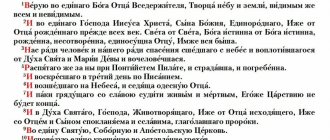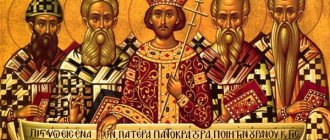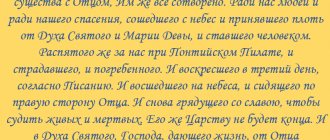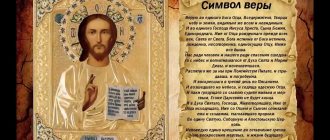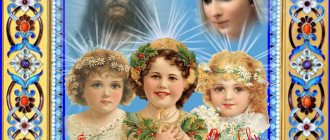Apostles' Creed
I believe in God, the Father Almighty, Creator of heaven and earth.
And in Jesus Christ, His only Son, our Lord, who was conceived by the Holy Spirit, born of the Virgin Mary, suffered under Pontius Pilate, was crucified, died and was buried, descended into hell, rose from the dead on the third day, ascended into heaven and He is seated at the right hand of God the Father almighty, and from there he will come to judge the living and the dead.
I believe in the Holy Spirit, the holy Universal Church, the communion of saints, forgiveness of sins, resurrection of the body, eternal life. Amen.
Nicene-Constantinople Creed
I believe in one God, the Almighty Father, Creator of heaven and earth, everything visible and invisible.
And in one Lord Jesus Christ, the Only Begotten Son of God, begotten of the Father before all ages, God from God, Light from Light, true God from true God, begotten, uncreated, consubstantial with the Father; through whom all things were created. For the sake of us, people, and for the sake of our salvation, He came down from heaven, and became incarnate from the Holy Spirit and the Virgin Mary and became Man; crucified for us under Pontius Pilate, suffered and buried, rose again on the third day according to the Scriptures, ascended into heaven and sits at the right hand of the Father, coming again in glory to judge the living and the dead, and of His kingdom there will be no end.
And in the Holy Spirit, the Life-Giving Lord, who proceeds from the Father and the Son, to whom, together with the Father and the Son, befits worship and glory, who spoke through the prophets.
And into one Holy Ecumenical and Apostolic Church. I confess one baptism for the remission of sins. I look forward to the resurrection of the dead and the life of the age to come. Amen.
WHAT DO ORTHODOX CHRISTIANS BELIEVE?
1 – What is the Orthodox Church?
Almost two thousand years ago, Jesus Christ, the Son of God, came to earth and founded the Church through His apostles and disciples for the salvation of man. Subsequently, the apostles spread the Church and its teaching throughout the world; they founded a number of local Churches, which are united by faith, worship, and participation in the sacraments of the Holy Church. Churches founded by the apostles personally include the Patriarchates of Constantinople, Alexandria, Antioch, Jerusalem and Rome. The Church of Constantinople was founded by St. Apostle Andrew the First-Called, the Church of Alexandria by St. Evangelist Mark, the Church of Antioch by St. Apostle Paul, the Church of Jerusalem by St. Paul and James, and the Church of Rome by St. Apostles Peter and Paul. In subsequent years, thanks to the missionary activities of the first Churches, the Sinai, Russian, Greek, Serbian, Bulgarian, Romanian and other Churches were created. Each of these Churches is independent in its governance, but - with the exception of the Roman Church, which finally separated from the others in 1054 - they are all bound by the unity of faith, teaching, apostolic tradition, sacraments, and worship. All together they constitute the Orthodox Church. The teaching of the Church is based on two sources: Holy Scripture and Holy Tradition, and Holy Scripture is an integral part of Holy Tradition and must be interpreted within its framework. As it is written in the Gospel of John, “Jesus did many other things; But if we were to write about this in detail, I think that the world itself could not contain the books that would be written” (John 21:25). Most of Christ's teaching, transmitted orally by the apostles, has come to us through Holy Tradition. The word "orthodoxy" is a translation of a Greek word that literally means "right teaching" or "right worship", as it comes from two words "correct" and "teaching" or "worship", as well as "glory". Since even in early Christian times false teachings and interpretations began to multiply, threatening the purity and correctness of church teaching, the definition of “Orthodox” began to be applied to the latter quite logically. The Orthodox Church carefully protects the truth from all kinds of errors and deviations in order to protect its flock and correctly glorify Christ, whose Body it is. Currently, a huge number of religious groups declare themselves to be successors to the early Church. It is necessary to have a criterion by which the original faith of the Church can be compared with the teachings promulgated by these factions. Of course, we all have the right to believe whatever we want. But before you make your final choice, it's wise to find out what you can choose from. We hope that a brief overview of our faith will help you become familiar with the Christianity that was founded and preached by the apostles of Jesus Christ. This is the criterion of truth that should guide the choice among various Christian doctrines.
2 – GOD THE FATHER
there is the beginning and cause of the Son and the Spirit (St. Basil the Great), but the Unity of the Father does not mean inequality. The Father would not be a true Father if he could not and did not want to communicate His nature to the Son and Spirit in the fullness of His Love. The Holy Scripture reveals to us the One God in three Persons - the Father, the Son and the Holy Spirit, who initially possessed one Divine nature. The Son is born from the Father “before all ages,” that is, before all time (Ps. 2:7; 2 Cor. 11:31). From the Father the Holy Spirit proceeds eternally (John 15:26). The Father loves us and sent His Son to give us eternal life (John 3:16).
3 – JESUS CHRIST
– Second Person of the Holy Trinity; God the Son, inseparable from the Father. The Father is in the Son, and the Son is in the Father (John 10:38). He became man, and thus He is both perfect God and perfect man. His coming to earth was predicted in advance by the prophets in the Old Testament. Since Jesus Christ occupies a central place in the Christian faith, the Orthodox Church pays special attention to His Person. Repeating the Nicene Creed, Orthodox Christians affirm their faith in the historical Jesus Christ in the following words: “I believe ... in one Lord Jesus Christ, the Son of God, the only begotten, who was born of the Father before all ages; Light from Light, true God from true God, born, uncreated, consubstantial with the Father, to Whom all things were. For our sake, man and our salvation came down from heaven and became incarnate from the Holy Spirit and the Virgin Mary, and became human. She was crucified for us under Pontius Pilate, and suffered and was buried. And he rose again on the third day according to the Scriptures. And ascended into heaven, and sits at the right hand of the Father. And again the coming one will be judged with glory by the living and the dead, but His Kingdom will have no end.”
4 – THE HOLY SPIRIT
- one of the Persons of the Holy Trinity, consubstantial with the Father. Orthodox Christians confess their faith in the Holy Spirit in the following words: “I believe... in the Holy Spirit, the Lord who gives life, who proceeds from the Father, who with the Father and the Son is worshiped and glorified...” He was “promised by the Father” (Acts 1:4 ) and then sent by Christ as a gift to the Church, so that the latter would receive the power to serve God (Acts 1: 8); to “pour out the love of God into our hearts” (Rom. 5:5) and impart to us the spiritual gifts (1 Cor. 12: 7-13) and virtues (Gal. 5: 22,23) necessary for Christian life and witness. Orthodox believe in the biblical promise that the Holy Spirit is given to us in the sacrament of anointing at baptism (Acts 2: 38). We must grow in the knowledge of the Holy Spirit throughout our lives.
5 – Incarnation
refers to the coming of Jesus Christ in the flesh. The Eternal Son of God the Father took upon Himself human nature. He is the only Divine Person possessing all the fullness of the Divine nature, which He received from God the Father, and all the fullness of human nature, borrowed by Him when He came to earth from the Virgin Mary. After the incarnation, God the Son forever becomes the owner of two natures in one Person. The Son of God, limitless in His Divinity, voluntarily imposed a limitation on Himself by taking on human flesh, while in which He experienced hunger, thirst, fatigue and, in the end, suffered death. The Incarnation is an integral part of Christianity. The New Testament says: “Every spirit that does not confess that Jesus Christ has come in the flesh is not from God” (1 John 4:3). By His incarnation, the Son of God redeemed human nature from sins, and salvation became available to everyone who unites with Him in His glorified humanity.
6 – Sin
literally means "miss". As the Apostle Paul writes, “all have sinned and fall short of the glory of God” (Rom. 3:23). We sin when we distort the good things that God has given us, depriving ourselves of what He has planned for us. Our sins separate us from God (Isa. 59:1-2), making us spiritually dead (Eph. 2:1) To save us, the Son of God took on human nature, and, being sinless, “condemned sin in the flesh” (Rom. 8:3). In His mercy, God forgives us our sins when we confess and turn away from them, giving us the strength to overcome sin and overcome evil in our lives: “If we confess our sins, then He, being faithful and righteous, will forgive us our sins and cleanse us.” us from all unrighteousness" (1 John 1:9)
7 – Rescue
– The gift of God, through which people are freed from sin and death, united with Christ and brought into His eternal Kingdom. Those who heard the Apostle Peter preach on the day of Pentecost asked what they needed to do to be saved? Peter answered: “Repent, and be baptized every one of you in the name of Jesus Christ for the forgiveness of sins: and you will receive the gift of the Holy Spirit” (Acts 2:38). Salvation begins with the following three steps: 1) repentance; 2) acceptance of baptism; 3) receiving the gifts of the Holy Spirit. To repent means to change our mind from what we were before, to turn away from sin, and to commit our lives to Christ. To be baptized means to be born again, united to Christ. Finally, to receive the gift of the Holy Spirit means to receive the Spirit Himself, which enables us to restore the image of God within ourselves. Faith in Jesus Christ is necessary for salvation. People cannot be saved by their good works. Salvation is “faith working through love.” This is a process that must continue continuously throughout our lives. Salvation has already happened in the past, since we are saved through the death and Resurrection of Christ. It takes place in the present, for we are saved by active participation in the life of the Church through faith in union with Christ by the power of the Holy Spirit. Salvation still awaits us in the future, since we must be saved at the Second Coming of Jesus Christ in glory.
8 – Baptism
is the way by which a person is truly united with Christ. The path to salvation begins in the waters of the baptismal font. The Apostle Paul in Romans 6:1-6 teaches that in baptism we are united to Christ in the likeness of His death and resurrection. In baptism, all our past sins are forgiven and, united with Christ, we receive strength to live a renewed, holy life. In the Orthodox Church, baptism is performed by complete immersion. Nowadays, some consider baptism to be only an “outward sign” of faith in Christ. This opinion has no historical or biblical basis. Others reduce it to the simple fulfillment of Christ's commandments (see Matt. 28: 19-20). Still others, completely ignoring the Holy Scriptures, reject baptism as a vital factor necessary for salvation. Orthodoxy claims that these modern fabrications rob sincere people of the most important knowledge of what baptism gives us: namely, that in baptism we are united with Christ and become members of His Church.
9 – New birth
- finding a new life. This is a way to enter the Kingdom of God and His Church. Jesus Christ said: “Unless one is born of water and the Spirit, he cannot enter the kingdom of God” (John 3:5). From its very foundation the Church has taught that by “water” here we mean the water of Baptism, and by “Spirit” the Holy Spirit. The new birth occurs to us in the water of baptism, where we are buried with Christ and then raised with Him in the renewal of His Resurrection, united with Him in His glorified nature (Acts 2:28; Rom.6:3-4). The idea of the second birth as a religious experience separate from baptism is a relatively recent one and has no biblical basis.
10 – Justification
- a word that is used in Holy Scripture to express the truth that we are forgiven in Christ and, in fact, made righteous in our lives. Justification is not given once and for all, it does not guarantee eternal salvation and depends on how sinful or righteous a person’s life will be in the future. This is in no way a legal act that turns an unrighteous person into a righteous person. On the contrary, justification is rather a dynamic, everyday reality for those who follow Christ and try to actively lead a righteous life with the assistance of God's grace given to all who believe in the Savior.
11 – Consecration
- this is a special allocation of someone or something by God and for God. It includes us in the process of purification and makes us holy through the mediation of Jesus Christ in the Holy Spirit. We are called to be holy and grow into the likeness of Christ. Once we have received the gift of the Holy Spirit, we actively participate in sanctification. We are co-workers with God, we work together with Him in order to know Him, becoming by grace what He is by nature.
12 – Bible
- the inspired Word of God (2 Tim. 3: 16), the main part of Divine revelation to the human race. The Old Testament tells the history of this revelation from the Creation of the world to the prophets. The New Testament tells the story of the birth and life of Jesus Christ and contains the writings of His apostles. It includes the Church's original apostolic teaching. Although these writings have been read in churches since their inception, the earliest lists of all the New Testament books that coincide with those known to us today were found in the 33rd rule of a local council held in Carthage in 318, and in a passage from the Feast Epistle of St. . Athanasius of Alexandria 367. Both sources list each and every book of the New Testament. A local council, apparently held in Rome in 382, established a complete list of the canonical books of both the Old and New Testaments. Holy Scripture is the basis of Orthodox worship and piety.
13 – Divine service
should include praise, glorification and thanksgiving to God - the Father, the Son and the Holy Spirit. All humanity is called to worship God. Worshiping God is more than looking at nature, or listening to sermons, or singing hymns. God can be known through His creation, but this does not constitute worship of God. And no matter how useful sermons are, they can in no way replace worship. The most important thing in Orthodox worship is the conciliar praise, thanksgiving and glorification of God by the Church. This worship is performed in close communion with God at His holy Table. One of the liturgical texts says: “To you belongs glory, honor and worship, to the Father, and to the Son, and to the Holy Spirit, now and ever and unto ages of ages. Amen". Orthodox worship, during which we unite with the inhabitants of heaven in our worship, really introduces us to the eternal Kingdom of God, to the time of the next century. We are truly witnesses and participants in the fulfillment of all things in Christ, who fills all in all.
14 – Eucharist
means "thanksgiving", and even in early Christian times this word became synonymous with Holy Communion. The Eucharist is the central moment of worship in the Orthodox Church. Because Jesus Christ said about the bread and wine that He gave at the Last Supper: “This is My Body, this is My Blood. Do this in remembrance of Me” (Luke 22: 19-20), His followers believe that this is actually the case. In the Eucharist we mysteriously partake of the Body and Blood of Christ, which impart to us strength and life. From the very beginning, the celebration of the Eucharist was an obligatory component of church life. Early Christians called the Eucharist “the elixir of eternity,” as they felt the enormous grace of God given in it.
15 – Liturgy
is a term used to describe a specific form of church public worship. Derived from a Greek word meaning "common cause." Wherever the Bible mentions heavenly worship of God, this word is used. In the Old Testament, God commanded that liturgy, or worship, be performed according to a certain pattern. This pattern is described in detail in the Books of Moses, Exodus and Leviticus. In the New Testament we see how the Church uses the worship of Old Testament Israel, performed in synagogues and in the Temple, enriching it with new experience - the experience of fulfilling Old Testament prophecies about Christ. Orthodox worship, which has developed over many centuries, still largely retains its ancient form. The main elements of the liturgy include hymns, reading and preaching of the Gospel, prayers and the Eucharist itself. For the Orthodox, the expressions “Liturgy” and “Divine Liturgy” correspond to the Eucharistic canon established by Christ Himself at the Last Supper.
16 – Communion of Saints
– When Christians leave this world, they continue to remain a living part of the Church, which is the Body of Christ. They are alive in the Lord and “written in heaven” (Heb. 12; 23). They worship God (Rev. 4:10) and inhabit His heavenly mansions (Heb. 12:22). They form a great “cloud of witnesses” surrounding us, and we try to imitate them in running “the race that is set before us” (Heb. 12:1). To deny or ignore the existence of the communion of saints is to deny that all who have died in Christ continue to be members of His Holy Church.
17 – Confession
– open recognition of one’s sins before God and people. The Holy Apostle James calls us to confess our sins against God before the elders, or, as they are called nowadays, before the priests (James 5: 16). We can also confess our sins directly to God (1 John 1:9). The Orthodox Church has always followed the New Testament practice of confession, both before a priest and personal confession before God. Confession is one of the most important components of repentance, giving us confidence that even our worst sins can truly be forgiven. It is also a powerful tool to help overcome sins.
18 – Discipline
necessary for the preservation of purity and holiness in the Church and is called upon to compel those who did not listen to the admonitions of their brothers and sisters in Christ to repent of their sins. Church discipline primarily uses excommunication from Holy Communion. The New Testament tells how the Apostle Paul imposed punishment (excommunication from communion) on an unrepentant man who had entered into an illicit relationship with his father's wife (1 Cor. 5: 1-5). The Apostle John warned us not to welcome into our homes those who willfully reject the truth of Christ (2 John 1:9-10). Throughout its history, the Orthodox Church has used disciplinary punishment (while showing mercy where necessary) not simply for the sake of punishment, but always with the goal of bringing about the necessary change of mind and heart and helping God's people live holy, pure lives.
19 – Blessed Virgin Mary
is called the Theotokos or Mother of God, because She carried in her womb and gave birth to the Son of God, and it was from Her that He took on human nature. Elizabeth, the mother of John the Baptist, saw this when she called Mary “Mother of my Lord” (Luke 1:43). Mary herself said about herself: “All generations will call me blessed” (Luke 1:48). That is why we, Orthodox Christians, call Her blessed. Mary lived a pure, holy life, and we honor her as a model of holiness, the first of the redeemed and saved, as the Mother of the new humanity revealed in the Person of her Son. The Orthodox do not understand why many Christians who belong to other faiths and claim to believe in the Bible do not call Mary blessed and do not honor the One who carried in her womb and nourished the Son of God, His human flesh.
20 – Prayers to the saints
commonly used in the Orthodox Church. Why? Yes, because physical death is not defeat and the end of everything for a Christian. This is a glorious transition to another world - to heaven. After his death, a Christian does not cease to be a member of the Church. And it also cannot be said that he remains on the sidelines, inactive, until the Day of Judgment. The true Church consists of those who abid in Christ - whether in heaven or on earth. Membership in it is not limited only to those living on earth. Those who abid in Christ, being in heaven, are alive, are in communion with God, worship Him, forming part of the one Body of Christ. They earnestly pray to God for all members of the Church and, perhaps, truly for the whole world (Eph. 6: 8; Rev. 8: 3). Therefore, we turn with prayers to the saints who have left this world, asking them to pray for us in the same way as we ask our Christian friends who are living today.
21 – Apostolic succession
(or apostolic succession) Is one of the key points of doctrine since the second century; this is not just a dogma, but the most important condition for maintaining the true faith. At that time, certain false teachers appeared on the historical stage, claiming that they were authoritative representatives of the Christian Church. Claiming the power they supposedly received from God, on the basis of the revelations revealed to them, some of them even built succession lines going back from them to Christ or to the apostles. In response to this, the early Church argued that there was a legitimate apostolic succession passed down from generation to generation through ordination. The Church recorded continuity by showing how the priesthood was ordained by the successors of the apostles chosen by Christ Himself. Apostolic succession is an indispensable factor in the preservation of Christian unity. Its members are responsible for ensuring that Church teaching and practice are maintained in accordance with the principles laid down by the apostles. Someone's personal belief in the correctness of any teaching cannot be considered as evidence of its truth. In our time, the concept of apostolic succession is criticized by those who stand outside it, considering themselves the only true followers of the early Church. The huge number of denominations existing in the world that have fallen away from the true tree of Christ largely has its source in the denial of apostolic succession.
22 – Church Councils
There was serious conflict in the early Church over the assertion of some legalists that Christians needed to follow the Jewish laws in order to receive salvation (Acts 15:1). “The apostles and elders met together to consider this matter” (Acts 15:6). This meeting, held in Jerusalem, served as a model for subsequent councils convened to solve pressing problems. Over the course of many centuries of church history, hundreds of such councils took place - local and regional, among which a special place is occupied by seven councils called Ecumenical, that is, relating to the entire Church. Since, according to the Orthodox belief, God Himself spoke through these councils, they serve as an authority for the Orthodox Church in matters of faith and church practice.
23 – Creed
From the very beginning, “symbols of faith” existed in the Church - not as formal, academic church decrees, but as living testimonies and confessions of the basic truths of the Christian faith. Such confessions of faith can be found already on the pages of the New Testament. Thus, the Apostle Paul quotes a certain creed to remind Timothy that “God was revealed in the flesh” (1 Tim. 3:16). Subsequently, the symbols of faith were approved at church councils; usually this was done in order to clearly articulate the truth in the face of heresies that threatened it. The most important for Christianity is the so-called Nicene-Constantinopolitan Creed, adopted at the first two Ecumenical Councils in the 4th century. Compiled in the midst of life-and-death disputes, it contains the entire essence of the New Testament teaching about the Holy Trinity, preserving this life-giving truth from the encroachments of those who wanted to change the very nature of God and reduce Jesus Christ to the level of a creature instead of the incarnate God. The creeds provide an accurate interpretation of Scripture in the face of those who would distort it to support their own religious views. Repeated during many church services, the Nicene-Constantinopolitan Creed constantly reminds an Orthodox person what he, as a member of the Church, personally believes in, while at the same time adhering to the faith of his ancestors.
24 – Spiritual gifts
When the young Church was just getting on its feet, God poured out His Holy Spirit on the apostles and their followers, endowing them with spiritual gifts for building the Church and serving each other. The special gifts of the Holy Spirit mentioned in the New Testament include the gift of wisdom and understanding, the gift of teaching, the gift of prophecy, the gift of discerning of spirits, the gift of tongues, the gift of interpreting tongues, the gift of ministry, the gift of shepherding and stewardship, and the gift of miracles. The Orthodox Church also recognizes other spiritual gifts. The degree of need for certain gifts changes over time. The gifts of the Holy Spirit are most evident in the liturgical and sacramental life of the Church.
25 – Second Coming
Among the various views currently existing in various parts of the Christian world regarding the Second Coming of Christ, the faith of the Orthodox Church is fundamental. Orthodox Christians confidently confess that Jesus Christ “will come to judge the living and the dead” and that “there will be no end to His Kingdom.” Orthodox preachers do not try to predict the times and dates of the Second Coming (no one can know this), but teach Orthodox Christians to live in such a way that they can calmly give an answer to the Lord when He comes (1 John 2:28).
26 – Heaven
– the place where the Throne of God is located, outside of time and space. God's angels live here, as well as saints who have left this world. We pray: “Our Father, who art in heaven...” Although Christians live in this world, they belong to the heavenly kingdom, and this kingdom is the true home. But the concept of heaven does not only refer to the next age. It also cannot be said that this is some place billions of light years away from us. Heaven – for the Orthodox – is a real part of Christian life and worship. The Eucharist is a heavenly service, heaven on earth. The Apostle Paul teaches that we are exalted with Christ into the heavenly mansions (Eph. 2:6), “fellow citizens with the saints and members of God’s household” (Eph. 2:19) And at the end of times new heavens and a new earth will be revealed (Rev. 21: 1)
27 – Hell
no matter how unpopular it may be among modern people, it actually really exists. The Orthodox Church understands hell as a place of eternal torment for those who voluntarily rejected God's grace. The Lord once said: “If your hand causes you to sin, cut it off: it is better for you to enter into life maimed, than having two hands to go into hell, into the unquenchable fire, where their worm does not die and the fire is not quenched” (Mark 9: 43- 44). He addressed the religious Pharisees with the question: “Serpents, brood of vipers! How will you escape from condemnation to Gehenna?” (Matthew 23:33). And he answered: “For God did not send His Son into the world to judge the world, but that the world might be saved through Him (John 3:17). Some day the Last Judgment Day will come, and there is a special place reserved for those who have hardened their hearts against God. It truly matters how we live our lives. Those who willingly reject the grace and mercy of God will have to bear the consequences of such a choice forever.
www.dorogadomoj.com
Afanasyevsky Creed
Anyone who wants to be saved must first of all have the Catholic Christian faith. Anyone who does not keep this faith intact and pure is undoubtedly doomed to eternal destruction.
The Catholic faith is that we worship one God in the Trinity and the Trinity in the One Divinity, without confusing the Hypostases and without dividing the Essence of the Divinity.
For one Hypostasis of the Divine is the Father, another is the Son, and the third is the Holy Spirit. But the Godhead - Father, Son and Holy Spirit - is one, the glory is the same, the majesty is eternal. As is the Father, so is the Son, and so is the Holy Spirit.
The Father is uncreated, the Son is uncreated, and the Spirit is uncreated. The Father is incomprehensible, the Son is incomprehensible, and the Holy Spirit is incomprehensible. The Father is eternal, the Son is eternal, and the Holy Spirit is eternal. Yet they are not three Eternals, but one Eternal. Just as there are not three Uncreated and three Incomprehensible, but one Uncreated and one Incomprehensible.
In the same way, the Father is omnipotent, the Son is omnipotent, and the Holy Spirit is omnipotent. But still there are not three Almighty Ones, but one Almighty One.
Likewise, the Father is God, the Son is God and the Holy Spirit is God. Although they are not three Gods, they are one God.
In the same way, the Father is Lord, the Son is Lord and the Holy Spirit is Lord. Yet there are not three Lords, but one Lord. For just as Christian truth encourages us to recognize each Person as God and Lord, so the Catholic faith forbids us to say that there are three Gods, or three Lords.
The Father is uncreated, uncreated and unbegotten. The Son comes only from the Father, He is not created or created, but begotten. The Holy Spirit comes from the Father and from the Son, He is not created, not created, not begotten, but proceeds.
So there is one Father and not three Fathers, one Son and not three Sons, one Holy Spirit and not three Holy Spirits. And in this Trinity no one is either first or subsequent, just as no one is greater or less than the others, but all three Hypostases are equally eternal and equal to each other.
And so in everything, as was said above, one must worship Unity in Trinity and Trinity in Unity. And anyone who wants to find salvation must reason about the Trinity in this way.
Moreover, eternal salvation requires a firm belief in the incarnation of our Lord Jesus Christ.
For this is righteous faith: we believe and confess our Lord Jesus Christ to be the Son of God, God and Man. God from the Essence of the Father, begotten before all ages; and Man, born from the nature of His Mother in due time.
Perfect God and perfect Man, possessing a rational Soul and a human Body. Equal to the Father in Divinity, and subordinate to the Father in His human essence.
Who, although he is God and Man, is not two, but one Christ. One not because the human essence has turned into God. Completely One, not because the essences were mixed, but because of the unity of the Hypostasis.
For just as the rational soul and flesh are one man, so God and Man are one Christ, who suffered for our salvation, descended into hell, and rose from the dead on the third day; He ascended into heaven, He is seated at the right hand of the Father, God Almighty, from where He will come to judge the living and the dead.
At His coming, all people will rise again bodily and give an account of their deeds. And those who do good will enter into eternal life. Those who commit evil go to eternal fire.
This is the Catholic faith. Anyone who does not sincerely and firmly believe in this cannot achieve salvation. Amen.
Catholic Creed: text, features, similarities and differences with the Orthodox
The conflict between the Western and Eastern Christian churches dates back to the 9th century. At that time, Photius stood at the head of the Eastern Christians, and Nicholas I was on the papal throne.
The official reasons for the conflict were questions about the legality of the election of Photius as patriarch.
However, many historians believe that the true motive was the political interests of the papacy in the Balkan lands.
The final split of the Christian churches occurred in 1054. From time to time, both sides made attempts to overcome its consequences, but to no avail. Although the mutual anathemas lost their relevance in 1965, since they were lifted by both the Ecumenical Patriarch Athenagoras and Pope Paul VI, the reunification of Christians never happened.
Each of the churches considers itself “one holy, catholic and apostolic.” Of course, each of them carries its own Creed to people. This concept includes not only the appearance of the crucifix or the manner of decorating church halls, its essence is much deeper.
What is the Creed?
The Creed, Catholic and Orthodox, is a set of main religious dogmas that forms the core system of teaching as a whole. In other words, in Christianity this term is understood as a summary of binding and unchangeable truths that are not subject to dispute or doubt. Accordingly, this term is essentially similar to the concept of an axiom.
The Symbol of Faith is a concept in many ways similar to the Conciliar Expositions, however, it is separated from these church documents. Conciliar statements of faith imply the result of the work of the high priests present at them. The primary dogmas of religion underlie the work of all Councils that have ever taken place.
Also, the Symbol of Faith is the text of a special prayer that appeared in the 4th century and became the result of the work of two Ecumenical Councils. This prayer expresses all the immutable truths for Christians, which is why it is called that. In other words, this prayer lists the Creeds available in the religion.
How did this concept come about?
Creed is a Western term. It was first mentioned in the texts of the Spanish bishop and theologian Ambrose of Milan, who baptized Augustine Aurelius. The bishop used this expression in his message addressed to Sirius I, who occupied the papal throne at that time.
In the Eastern Christian tradition, another concept is accepted - teachings or confessions of faith. However, many theologians, including those belonging to the Orthodox Church, believe that both terms should be used, since they do not contradict one another. The concepts are not completely analogous.
Over time, with the identification of certain church teachings, for example, Anglicanism, the concept of the Creed expanded.
Today there are several dogmas of faith, but each of them is based on the Symbols voiced by the disciples of Christ, the apostles. However, the Apostles' Creed was formulated only in the second century.
It acted as a counterweight to the spreading ideas of Docetism and was compiled on the basis of the catechism used for the sacrament of baptism at that time.
Creed in Catholicism
For a person who does not identify himself with any of the Christian denominations, the external differences between Catholicism and Orthodoxy are obvious. However, these are not the only differences between the Orthodox and Western traditions. For example, the Catholic Creed has a completely different text of the prayer that expresses it.
The Catholic prayer expressing the fundamental truths of Christianity is called the Credo. Translated from Latin, it means “I believe.”
This prayer is an ordinary part of the Mass, and you can hear the Catholic Creed in Russian by attending a Sunday service in any of the churches where readings are practiced not only in Latin.
For example, in Moscow you can go to Mass at the Cathedral of the Immaculate Conception of the Blessed Virgin Mary on Malaya Gruzinskaya Street. The Russian version of the text of this prayer is also presented in the illustration.
The Credo is based on the Nicene-Constantinopolitan Creed. Along with it, Catholicism recognizes the Afanasyevsky Creed. It was compiled by Athanasius the Great in the fourth century and contains forty paragraphs. This Catholic Creed is read at the celebration of Trinity.
What is the main difference between Orthodox and Catholic teachings?
There are many differences between Catholicism and the orthodox religious tradition. In addition to those that are obvious outwardly, there are also deeper ones that relate directly to the religious worldview.
For example, the Catholic Creed, as a set of immutable truths, includes the concept of purgatory.
Followers of the Latin rite believe not only in Heaven and Hell, but also in the presence in Heaven of a special place in which the souls of people find themselves who have not led their lives righteously enough, but also have no terrible sins.
That is, in this place there are souls in need of purification before they are admitted into the Kingdom of Heaven.
Those who adhere to orthodox Christian traditions have a completely different idea of the path of the soul after the end of earthly life. In Orthodoxy there is the concept of Hell and Paradise, as well as the ordeal through which the human spirit passes before reunification with the Almighty or immersion in eternal torment.
Source: //labuda.blog/197998

